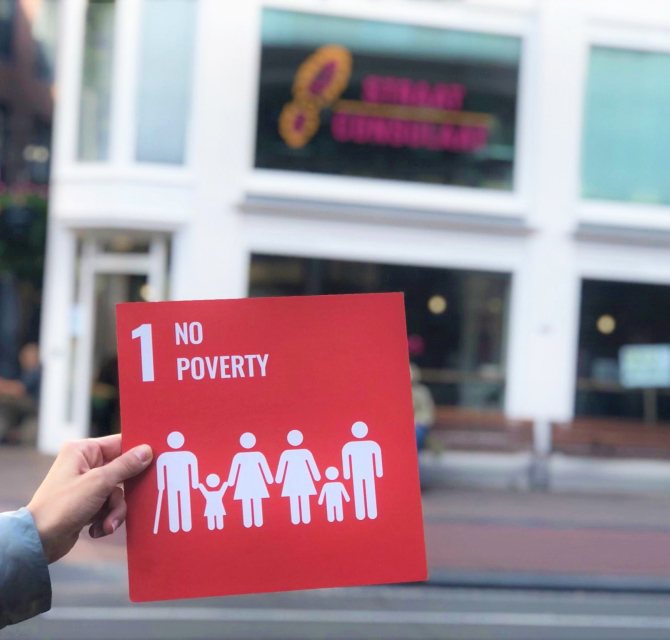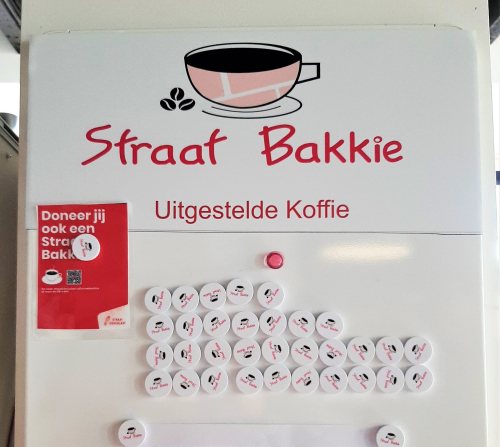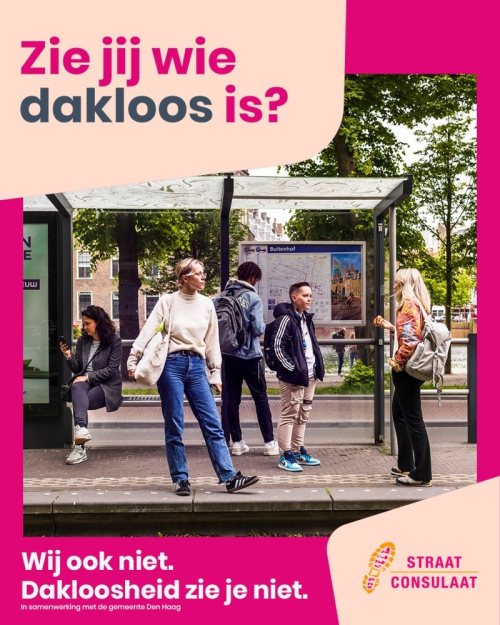
“We look the other way because we do not want to see it”: Straat Consulaat about homelessness
3 November 2023
Straat Consulaat has been a well-known institution in The Hague for many years. They advocate for people who are homeless. They assist approximately 1,000 individuals annually, but the number of people they engage with and help is much larger. Through its work, Straat Consulaat contributes to various Sustainable Development Goals (SDGs), such as goal 1: no poverty and goal 11: sustainable cities and communities. The SDG team visited Straat Consulaat and spoke with Joy and Ron.
Café Straat Bakkie
Since May of this year, Straat Consulaat is housed in a beautiful four-story building at Torenstraat 35A. They were fortunate to acquire this building. The ‘Straat Bakkie’ café on the ground floor has been given a fresh coat of paint and a trendy interior. “The baristas are people who have experienced homelessness themselves. We provide them with barista training”, Joy explains. Joy is an advocate and has been working at Straat Consulaat for 15 years. “This place is more than just a café. It is a meeting place, an open space for everyone”. People at the tables by the window enjoy a cup of coffee or tea in peace. The concept of ‘suspended coffee’ is an idea that originated in Italy. You can buy a cup of coffee and leave it for someone who cannot afford it. For each ‘suspended coffee’, you leave a magnet on a board that someone else can redeem for a coffee. It is one of the many initiatives of Straat Consulaat.

A distorted image
There are various reasons why someone can become homeless. For example, due to a divorce, job loss, addiction, discharge from an institution, or when youth care ends when someone turns 18. “Homelessness can happen to anyone,” emphasizes Ron, a client supporter who has also experienced homelessness in the past. “Most people are just three months’ worth of salary away from homelessness. I have seen people from all ranks of society become homeless. Anyone can stumble in life.”
Most people often have a distorted image of the homeless. They tend to picture an old man with a long beard on a park bench, but in reality, the group is much more diverse. Straat Consulaat aims to change the negative perception of homeless people, for example through campaigns. “In most cases you cannot tell from the outside that people are homeless,” explains Joy. Even people who sleep on a friend’s couch because they have nowhere else to go are considered homeless. Recent research, the Ethos calculation in Oss and Den Bosch, shows that there are more homeless women and minors than previously thought. Joy is pleased with this research and hopes that a similar study will follow soon in The Hague. “To formulate effective policies, we need to know the size and composition of the target group,” Joy explains. As an advocate, Joy regularly engages with local and national authorities. She ensures that people with experience of homelessness are heard in discussions about what needs to change. Their input is very valuable. “I want our experience experts to genuinely participate in the debate and to not just pose for a photo,” says Joy.

‘Always on the move, but you never arrive anywhere’
Homelessness can lead to a severe trauma. Even when people manage to overcome it, they often carry that experience with them for many years. Ron explains, “Homeless people experience pain, sorrow, and shame, just like all of us. The most significant trauma homeless people carry is the idea that they do not matter. Homeless people often make a significant effort to look presentable and put their best food forward. That is when you notice that you are taken more seriously. Nobody wants to smell.” According to Ron, real recovery begins when someone has a stable place to live again. “I could only get my life back on track when I finally got a permanent residence. As a homeless person, you are always on the move, but you never arrive anywhere.” The current housing crisis means that it often takes years for someone to find a stable place to live. The fundamental solution, Ron and Joy agree, is the need to build more houses. Straat Consulaat is also in discussion with the local government on this matter.
Tips and personal attention
Through their work, Ron and Joy, along with dozens of staff and volunteers, make a difference in people’s lives. People can always call or message Ron and Joy, and their phone numbers are on the website. “What is often forgotten is that many homeless people do not have prepaid minutes or data on their mobile phones. They have to go to the library or the supermarket for that,” Joy explains. Straat Consulaat has created a booklet with tips. The ‘straat gids’ provides information on what to do if you become homeless. It includes guidance on how to see a doctor, where to find sleeping accommodations, or how to manage debts. Additionally, Straat Consulaat offers people a level of personal attention they cannot find anywhere else. Joy has even attended a childbirth before. “As a gift, I made a photo album with baby pictures for the mother. It may seem like a small gesture, but social workers do not have time for this. For some, we are invaluable,” says Joy.
What can you do if you want to help? Of course, you can donate money, but a small gesture can mean a lot too: “Simply looking at someone and saying hello. Just recognizing a person as a human being. You should spend ten minutes standing next to a person selling the street newspaper at the supermarket. You will be completely ignored,” Joy says.
Want to learn more?
If you want to learn more, contribute to, or help at Straat Consulaat, please visit their website: www.straatconsulaat.nl.